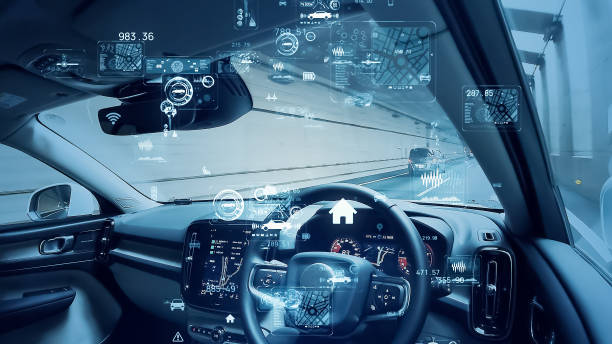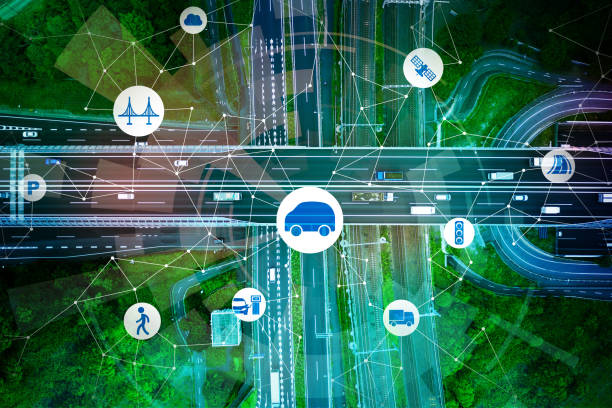Introduction
The rapid development of autonomous vehicles has ushered in a new era of mobility and technology. These vehicles, equipped with advanced sensors, artificial intelligence, and sophisticated data processing systems, are redefining transportation as we know it. As the autonomous vehicle industry continues to grow, one critical aspect that demands attention is the ownership and control of the vast amounts of data generated by these vehicles. This data, including sensor readings, navigational information, and real-time environmental data, is a valuable asset that has the potential to revolutionize various industries, from transportation to urban planning and beyond. However, the complex interplay between patent law and data ownership in the autonomous vehicle sector poses several challenges that require careful consideration.

The Crucial Role of Patents in Autonomous Vehicle Technology
The crucial role of patents in the realm of autonomous vehicle technology cannot be overstated. Patents serve as the foundation for fostering innovation, encouraging investment, and safeguarding intellectual property rights in this rapidly evolving industry. Several key areas underscore the significance of patents in driving the advancement of autonomous vehicle technology.
1. Encouraging Research and Development
Patents provide a vital incentive for companies and researchers to invest in the extensive research and development required for the progression of autonomous vehicle technology. The substantial financial commitments and technical expertise necessary to develop cutting-edge systems and components are often supported by the promise of exclusive rights and commercial benefits through patent protection. This encouragement of research and development efforts is crucial for pushing the boundaries of what is achievable in autonomous vehicle technology.
2. Protection of Innovative Technologies
In the competitive landscape of autonomous vehicles, numerous breakthroughs and technological advancements continuously emerge. Patents serve as a protective shield for these innovations, preventing unauthorized use, replication, or commercial exploitation by competitors. This protection fosters a climate of innovation, where inventors and companies can confidently invest in new and groundbreaking technologies, knowing that their efforts will be safeguarded from infringement and misappropriation.
3. Incentivizing Investment and Commercialization
The assurance of exclusivity provided by patents acts as a significant incentive for investment in the commercialization of autonomous vehicle technologies. Companies, entrepreneurs, and investors are more likely to allocate resources towards the mass production and market deployment of autonomous vehicle systems when they have the assurance that their investments will be protected and potentially yield substantial returns. This incentivization of investment is instrumental in driving the widespread adoption and integration of autonomous vehicle technology into mainstream transportation systems.
4. Promoting Collaboration and Partnerships
While patents offer protection, they can also act as catalysts for collaboration and partnerships within the autonomous vehicle industry. Companies may engage in cross-licensing agreements, enabling them to share patented technologies and components while avoiding legal disputes and fostering an environment of mutual growth. Such collaborations can lead to the creation of more comprehensive and sophisticated autonomous vehicle solutions, leveraging the collective expertise and resources of multiple entities.
5. Setting Industry Standards
Patents often play a pivotal role in setting industry standards for autonomous vehicle technology. Companies with patented technologies that become widely adopted in the industry can influence the direction and development of future technologies, shaping the overall trajectory of the autonomous vehicle sector. Additionally, patents can encourage the establishment of standardized protocols and systems, facilitating interoperability and compatibility among different autonomous vehicle platforms and components.
6. Encouraging Technological Diversity and Specialization
The existence of patents in autonomous vehicle technology encourages a diverse range of innovations and specialized advancements. Companies and researchers are driven to explore unique approaches and solutions, leading to a rich tapestry of technological diversity within the industry. This diversity not only fosters healthy competition but also contributes to a more robust and resilient ecosystem, where various technological paradigms can coexist and complement each other, ultimately benefiting the advancement of autonomous vehicle technology as a whole.
In summary, patents serve as the bedrock of innovation and development in the autonomous vehicle industry, encouraging investment, protecting intellectual property, fostering collaboration, and setting industry standards. As the autonomous vehicle sector continues to evolve, the crucial role of patents will remain integral in shaping the future of transportation and technology.

Challenges Arising from Data Ownership
While the ownership and control of data in the autonomous vehicle sector offer unprecedented opportunities for innovation and advancement, several challenges emerge in the context of data ownership. These challenges stem from the intricate nature of data collection, storage, and utilization within the autonomous vehicle ecosystem. Addressing these challenges is crucial for fostering responsible data management practices and ensuring the protection of consumer privacy. Some of the prominent challenges arising from data ownership in autonomous vehicles include:
1. Complex Data Ecosystem and Stakeholder Interests
Autonomous vehicles generate a vast and complex ecosystem of data involving various stakeholders, including manufacturers, software developers, data aggregators, and service providers. Determining ownership and control of this data becomes increasingly intricate when multiple entities contribute to the development, operation, and maintenance of autonomous vehicles. Conflicting interests and divergent data management practices among stakeholders can lead to disputes over data ownership, potentially hindering collaboration and innovation within the industry.
2. Data Privacy and Security Concerns
The data generated by autonomous vehicles often includes sensitive information, such as location data, driving patterns, and personal preferences of passengers. Safeguarding this data from unauthorized access, misuse, or cyber-attacks is critical to maintaining consumer trust and complying with data protection regulations. Data privacy and security concerns become even more pronounced when autonomous vehicles interact with external infrastructures and systems, necessitating robust security measures to prevent data breaches and ensure the integrity of personal information.
3. Cross-Border Data Regulations and Compliance
As autonomous vehicles operate across various geographic regions and jurisdictions, adhering to diverse data protection regulations and cross-border data transfer restrictions poses a significant challenge. Differences in data privacy laws and regulatory frameworks necessitate careful consideration when determining the transfer, storage, and processing of autonomous vehicle data across international boundaries. Ensuring compliance with these regulations while facilitating seamless data sharing and collaboration among global stakeholders requires a comprehensive understanding of regional data protection requirements and an adaptable approach to data management practices.
4. Ethical Dilemmas and Responsible Data Use
The ethical implications of data ownership in the autonomous vehicle sector are of paramount importance. Balancing the need for data access and analysis with the ethical responsibilities of protecting consumer privacy and promoting responsible data use presents a significant challenge. Ensuring that data collection and utilization practices align with ethical standards and societal expectations is essential for building public trust and fostering a positive perception of autonomous vehicle technology. Ethical considerations must be integrated into the design and implementation of data management strategies to mitigate potential risks and promote responsible data stewardship within the industry.
5. Long-Term Data Storage and Accessibility
The long-term storage and accessibility of autonomous vehicle data pose technical and logistical challenges. Managing the vast volumes of data generated by autonomous vehicles over extended periods requires robust data storage infrastructure and effective data retrieval mechanisms. Ensuring the availability and accessibility of historical data for future research, analysis, and development purposes is crucial for leveraging the full potential of autonomous vehicle data. Implementing scalable and secure data storage solutions that accommodate the evolving data requirements of the autonomous vehicle industry is essential for addressing this challenge.
6. Liability and Accountability for Data Misuse or Malfunction
The issue of liability and accountability for data misuse or malfunction in autonomous vehicles remains a significant concern. Determining responsibility in the event of data breaches, system malfunctions, or accidents caused by erroneous data poses a legal and regulatory challenge for the industry. Establishing clear guidelines and frameworks for attributing liability and ensuring accountability in cases of data-related incidents is essential for maintaining consumer confidence and promoting the safe and responsible deployment of autonomous vehicle technologies.
7. Data Monetization and Fair Compensation
In the context of autonomous vehicles, data monetization raises questions about fair compensation for data owners and users. Determining appropriate mechanisms for fairly compensating data contributors while enabling the commercialization of data-driven services and applications poses a complex economic challenge. Establishing transparent and equitable data-sharing models that recognize the value of data contributions and facilitate fair remuneration for data ownership and usage rights is crucial for fostering a sustainable and inclusive data economy within the autonomous vehicle industry.
In sum, addressing the multifaceted challenges arising from data ownership in the autonomous vehicle sector requires a comprehensive approach that prioritizes data privacy, security, regulatory compliance, ethical considerations, and equitable data management practices. By proactively addressing these challenges, the industry can foster a responsible and sustainable data ecosystem that promotes innovation, protects consumer interests, and upholds the integrity and trustworthiness of autonomous vehicle technologies.
Balancing Patent Rights and Data Access
Balancing patent rights and data access in the context of autonomous vehicles presents a complex challenge that requires a nuanced approach to foster innovation while promoting responsible data management practices. Achieving a harmonious equilibrium between protecting intellectual property and facilitating data access is crucial for driving advancements in autonomous vehicle technology while ensuring the responsible use and sharing of valuable data. Several key strategies can help address this delicate balance:
1. Licensing and Collaboration Agreements
Establishing clear and transparent licensing agreements between patent holders and data users can facilitate the fair and equitable sharing of data while safeguarding patent rights. Collaborative research and development initiatives that encourage the exchange of data for mutual technological advancement can foster a culture of cooperation within the autonomous vehicle industry. By promoting collaborative partnerships and fostering a spirit of innovation, stakeholders can strike a balance between protecting patent rights and enabling access to valuable data for further research and development endeavors.
2. Data Anonymization and Aggregation Techniques
Implementing robust data anonymization and aggregation techniques can help protect individual privacy while enabling the utilization of data for research and analysis purposes. By dissociating personal identifiers from the data, companies can mitigate privacy concerns while leveraging aggregated data sets to extract valuable insights without compromising the confidentiality of sensitive information. Integrating stringent data anonymization protocols into data management practices can promote data access while upholding privacy standards and complying with data protection regulations.
3. Standardization and Interoperability Efforts
Encouraging the development of industry-wide data standards and interoperable systems can facilitate seamless data sharing and collaboration among different stakeholders in the autonomous vehicle sector. By promoting standardized data formats and communication protocols, companies can streamline data exchange processes while ensuring compatibility and integration across diverse autonomous vehicle platforms. Standardization efforts can promote data access while fostering innovation and interoperability within the industry.
4. Regulatory Frameworks for Data Ownership
Establishing comprehensive regulatory frameworks that define data ownership rights, data usage policies, and data sharing protocols can provide clarity and legal certainty for all parties involved. Regulatory frameworks should incorporate provisions for protecting intellectual property rights while ensuring that data is utilized responsibly and in compliance with privacy regulations. By fostering a regulatory environment that balances the interests of patent holders and data users, policymakers can promote a fair and equitable approach to data access within the autonomous vehicle industry.
5. Ethical Data Governance and Transparency
Adopting ethical data governance practices and promoting transparency in data management processes are essential for building trust and credibility within the autonomous vehicle ecosystem. Implementing clear guidelines for the ethical collection, use, and sharing of data can foster a culture of responsible data stewardship and promote ethical decision-making practices among industry stakeholders. By prioritizing transparency and accountability in data access and utilization, companies can demonstrate a commitment to upholding ethical standards while leveraging data for innovation and technological advancements.
6. Public-Private Partnerships for Data Sharing
Facilitating public-private partnerships that encourage data sharing and collaboration between industry stakeholders and governmental institutions can promote the responsible and inclusive use of autonomous vehicle data. By fostering a collaborative environment that prioritizes the public interest while respecting intellectual property rights, stakeholders can work together to leverage data for the development of innovative solutions and services that benefit society as a whole. Public-private partnerships can foster data access while ensuring that data-driven initiatives align with regulatory standards and ethical guidelines.
7. Data Governance and Accountability Mechanisms
Implementing robust data governance frameworks and accountability mechanisms can promote responsible data management practices and ensure the protection of intellectual property rights. By establishing clear data governance structures and accountability mechanisms, companies can demonstrate a commitment to upholding ethical data practices and complying with regulatory requirements. Data governance and accountability mechanisms can foster a culture of trust and integrity within the autonomous vehicle industry while promoting the responsible use and sharing of valuable data assets.

Emerging Trends and Future Implications
As the autonomous vehicle industry continues to evolve, several emerging trends are likely to shape the future of data ownership and patent considerations:
- Blockchain Technology Integration: The integration of blockchain technology can enhance data security and transparency, enabling secure data sharing while maintaining the integrity and authenticity of shared information. Blockchain-based solutions can streamline data transactions and provide a decentralized framework for managing data ownership rights.
- Advancements in Edge Computing: The proliferation of edge computing technologies can enable data processing and analysis to occur closer to the source, reducing latency and enhancing data privacy. By leveraging edge computing capabilities, autonomous vehicles can process and extract valuable insights from data without compromising sensitive information.
- Ethical and Regulatory Frameworks for AI Data Usage: Establishing ethical guidelines and regulatory frameworks for the responsible use of AI and autonomous vehicle data can foster public trust and ensure that data is utilized in a manner that aligns with societal values and norms. Ethical considerations should be integrated into the development of AI algorithms and data-driven decision-making processes.
Conclusion
The convergence of patent considerations and data ownership in the autonomous vehicle industry necessitates a comprehensive approach that balances innovation, data privacy, and regulatory compliance. By fostering collaboration, implementing robust data protection measures, and advocating for transparent and ethical data usage, stakeholders can navigate the complex landscape of autonomous vehicle data ownership while promoting technological advancements and ensuring the responsible utilization of valuable intellectual property.
As the autonomous vehicle ecosystem continues to expand, addressing patent considerations and data ownership challenges will be paramount in shaping a sustainable and inclusive future for the industry, driving innovation while upholding ethical and legal standards.
With the ongoing development in the autonomous vehicle sector and the ever-evolving landscape of patent and data ownership, the future of this field remains dynamic and promising.

